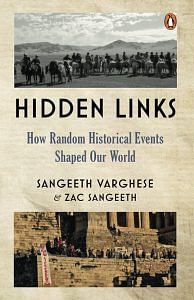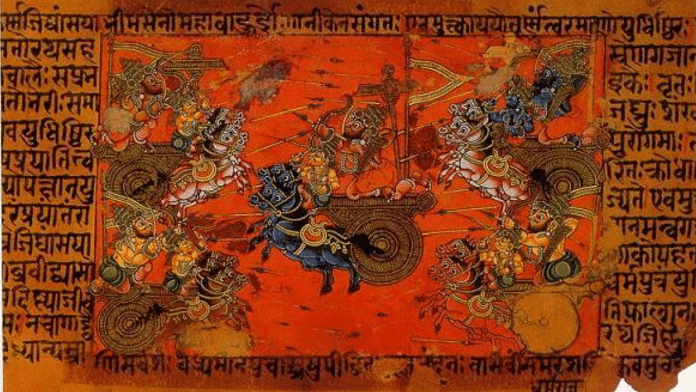Revenge is best served cold. Drona realized his moment had arrived when he was asked by the Kurus what fee he expected for his services to their kingdom. He went for the jugular and asked for the impossible—the arrest of Drupada. Though initially surprised at this strange request, Bhishma, the eldest of the Kuru kingdom, was only happy to oblige. He sensed an opportunity there, as the Kurus were now under the shadow of the mighty Panchala kingdom, their arch-rivals. Under the Kuru banner, a surprise attack by the young princes was meticulously strategized and put together by Bhishma and Drona. Surprise it was, because it led to the defeat of the Panchala king Drupada.
As Drupada was presented before Drona, it was time to return the favour. The mighty Panchala king was publicly insulted and his kingdom was split into two—the Southern Panchala continued under Drupada, while Northern Panchala adjoining the Kuru kingdom was now under the lordship of Drona, a subordinate of the Kuru rulers. The centre of power in the Gangetic basin, held by the Panchala kingdom for generations together, now shifted to their fiercest adversary, the Kuru kingdom, that too in the most disgraceful manner.
A Glass of Milk Redefined a Nation
Drupada insulted Drona. Drona aligned with his archenemies and paid back in full measure, thereby upsetting the regional balance of power. However, what really triggered this geographical realignment might in reality would have been a tiny inconsequential incident. When Ashwathama, the son of Drona, was a young child, he longed to have a glass of milk. But Drona, a poor man, could not afford to keep a cow, and was heartbroken when he saw his child being humiliated by his friends with water mixed with flour. Unable to witness his child’s plight, an impoverished Drona turned to his childhood friend Drupada for help. But once the king turned down Drona’s request, a chain of events was set in motion. Much like a butterfly effect, a small incident such as a child crying for a glass of milk, eventually led to the destruction of mighty kingdoms and the reorganization of the entire history of a nation.
Drupada Co-opted Pandavas to Repay Kurus and Drona
As the Panchala chips were now down, Drupada carried the burden of revenge against Drona and the Kuru kingdom. His children were brought up as the breeding ground of this hatred. When Drupada saw a sliver of opportunity arise through the enmity between the Kauravas and Pandavas, he caught on to it. He focused on Arjuna, the young, valiant archer, whose prowess he had witnessed personally on the battlefield that had initially led to his defeat. If he could win Arjuna over to his side, he stood a great chance of tilting the scales of power yet again. As his children grew up to be adults, Drupada realized that his time had now arrived. Hence, a well-planned track and trace programme was organized under the veil of choosing a groom for Draupadi. However, there was still one more impediment. Since Arjuna was only the third brother of the Pandavas, there was little chance that Draupadi’s children would inherit the Kuru kingdom unless she was also wedded to the eldest Kuru prince Yudhishtira. But if Draupadi was married to all the brothers, then not only did a grandchild of Drupada have a shot at sitting on the Kuru throne, they would also have a chance of putting up a united front.
Mahabharata Not a Kuru-Pandava War, Rather a Panchala-Kuru War
Hence, even if tens of thousands of lives needed to be sacrificed, Draupadi would not hesitate to go to war. Drupada would gladly take up all the risk—put all his sons and grandsons on the battleground, committing all his military resources including that of their vassal states. Panchala would then nominate Drishtadyumna as the Supreme Commander of the combined armies. All because in reality it was not a war between the Pandavas and Kauravas, but between the great kingdoms of Kurus and Panchala. All the other Mahajanapadas would join the war as allies to either Kuru or Panchala, because this war would redefine their existence in the Indo-Gangetic basin.
Panchala Won the War but Lost Their King
Unfortunately, the war resulted in a winner’s curse. Though the Panchalas and Pandavas eventually emerged victorious, the losses they suffered were immense. Drupada’s sons and grandsons were killed by the Kuru commanders Drona, Karna and Ashwathama. King Drupada himself was slain on the fifteenth day by Drona. To add to the woes of the kingdom of Panchala, on the last day of the war, Ashwathama attacked the Pandava camp at night and set it on fire. Those killed included Drishtadymna, Shikhandi and the children of Draupadi, all of who would have been in line to the throne and could have replaced Drupada. So, in effect, even after a much-yearned-for victory, the kingdom of Panchala was left without a rightful heir from their own bloodline.
 This excerpt from ‘Hidden Histories’ by Sangeeth Varghese and Zac Sangeeth has been published with permission from Penguin India.
This excerpt from ‘Hidden Histories’ by Sangeeth Varghese and Zac Sangeeth has been published with permission from Penguin India.



